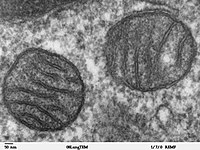
Photo from wikipedia
ABSTRACT Heart failure is defined as a drop in heart’s pump function, accounting for reduced blood output and venous stasis, and constitutes the end stage of various cardiovascular diseases. Although… Click to show full abstract
ABSTRACT Heart failure is defined as a drop in heart’s pump function, accounting for reduced blood output and venous stasis, and constitutes the end stage of various cardiovascular diseases. Although mild mitochondrial dysfunction may hinder cardiomyocyte metabolism and impair myocardial function, severe mitochondrial injury is accompanied by cardiomyocyte apoptosis, leading to irreversible damage of the heart. Selective autophagy of mitochondria, or mitophagy, serves to rapidly remove dysfunctional mitochondria and restore the health of the mitochondrial population within cells by allowing reutilization of degradative substrates such as amino acids, fatty acids, and nucleotides. Although mitophagy represents a protective program that prevents the accumulation of poorly structured or damaged mitochondria, excessive mitophagy leads to mitochondrial population decline, impaired oxidative phosphorylation, and decreased ATP production. In this review, we first discuss the molecular underpinnings of mitophagy and the roles of different mitophagy adaptors. Then, the multiple and complex influence of mitophagy on heart failure is summarized. Finally, novel pharmacological strategies targeting mitophagy to relieve heart failure are briefly summarized.
Journal Title: Cell Cycle
Year Published: 2023
Link to full text (if available)
Share on Social Media: Sign Up to like & get
recommendations!